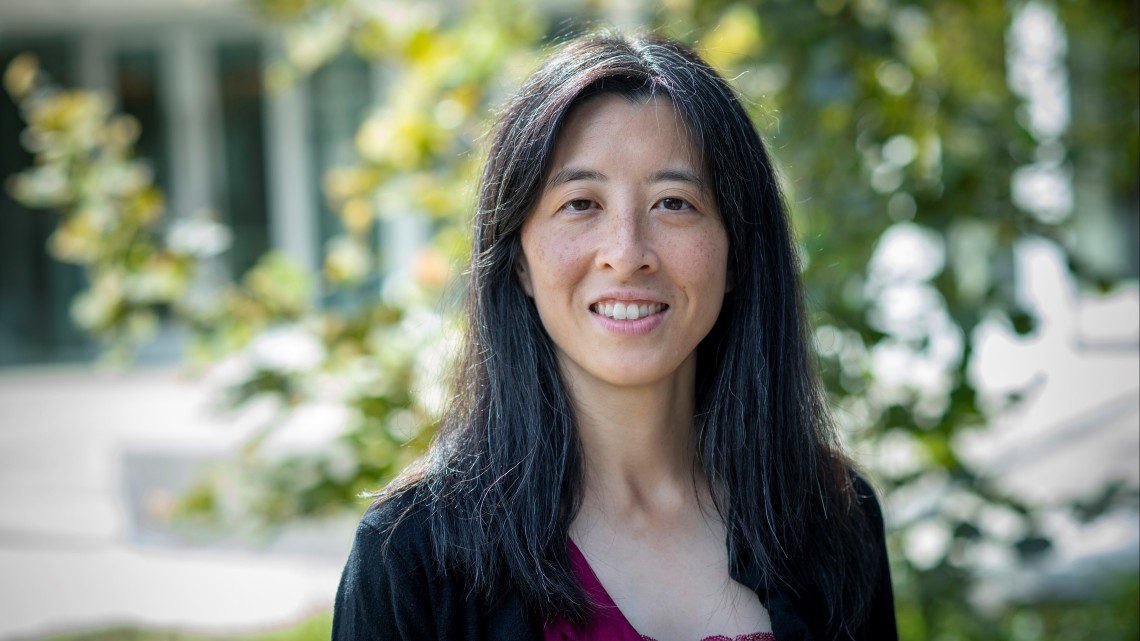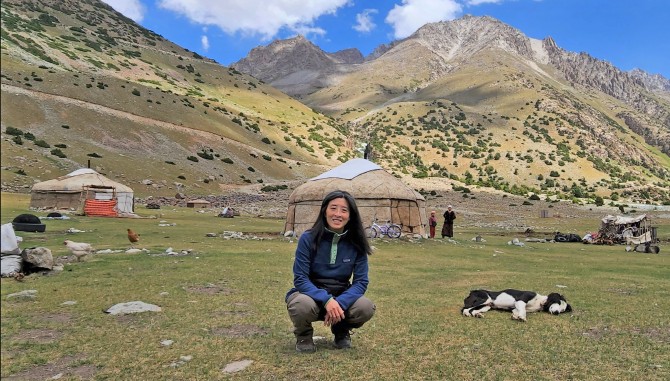
News directly from Cornell's colleges and centers
Staff Stories: Helen Lee
Behind operations at Cornell Wildlife Health Center
By Grace DePaull
Living in Seattle, Washington, Helen Lee ’03, MBA '20, is surrounded by nature – lakes, oceans, beaches and the snow-capped ridges of the Olympic Mountains, which she sees from her window every morning.
Her surroundings are a constant reminder that her work directly impacts the world around her, even while residing 2,700 miles west of Cornell, where she currently works as the assistant director of wildlife health and health policy at the College of Veterinary Medicine.
In her current role, Lee helps manage the strategies, programs and operations for the Cornell Wildlife Health Center while also serving as a conservation and livelihoods advisor on field projects. Her work ranges from fundraising, marketing and communications to managing programs, projects and partnerships. She even conducts her own research.
“I do a little of everything,” Lee said. “I love the diversity of my responsibilities because it keeps me engaged and intellectually challenged while tapping into many different skill sets. I’ve found a job where I really feel like I'm making a difference and helping educate people about the importance of wildlife and conservation.”
Lee has found her happy place – having one foot in the business world and one in the science world. While her passion for wildlife began at a young age, spending hours observing insects and other critters in her backyard and devouring every wildlife book at her local library, her interest in business management emerged only after exploring it in college.
“I ended up veering off the veterinary path and became really fascinated by the psychology of working with teams and understanding and influencing people’s behaviors,” Lee said.
Lee graduated from Cornell with a Bachelor of Science in Applied Economics and Management from the Charles H. Dyson School of Applied Economics and Management. Upon graduating, she pursued a career in the corporate sector, working as a district manager for Aldi. After nearly four years of working in this role, Lee began to feel as though something was missing. She quit her job to pursue a career that aligned with her passion for wildlife conservation and left the corporate world behind.
Lee spent the next ten years at the Wildlife Conservation Society (WCS), where she became the assistant director of wildlife health and oversaw global projects across 25 countries in Asia, Africa and Latin America. While at WCS, Lee developed connections throughout these countries and within the organization – one of which led her back to Cornell.
In 2017, when Lee’s previous manager at WCS approached her about creating a new center of excellence around wildlife health and conservation at the university, she jumped at the opportunity.
“I enjoyed working at WCS, and I really believed in the mission,” Lee said. “But this offered a different challenge. Helping to create and build something from the ground up was exciting to me. It was a meaningful step for the next stage of my professional growth – to help start something new.”
The Cornell Wildlife Health Center, which launched in March 2020, is an applied research center that prioritizes catalyzing policy change in support of sustainable and holistic solutions to address challenges impacting wildlife, livestock, human and environmental health worldwide. Currently, work is underway in North America, Asia and Africa.
As part of continuing her own education, Lee had the opportunity to pursue fieldwork in Central Asia. She enrolled in the Cornell Executive MBA Americas program at the Samuel Curtis Johnson Graduate School of Management, leading her to the remote mountains of Tajikistan for a consulting project. There, her fieldwork focused on improvements for local herding communities with an emphasis on sustainable management of critical rangelands. Traveling with a team of veterinarians, she trekked through towering mountains and visited villages with no running water or electricity, studying how farmers could improve income through their livestock while sustainably coexisting with the region’s wild sheep, goats and snow leopards.
“I was humbled by how generous and warm everybody was. A lot of the people I interviewed and worked with faced economic hardships, yet they welcomed us into their homes and were open to talking about the challenges of providing for their families,” Lee said.
Making these kinds of global interconnections is what motivates Lee in her work at the Cornell Wildlife Health Center and is something she believes is critical to conservation efforts moving forward.
“I love being part of a team that is trying to advocate for wild species that can’t advocate for themselves,” Lee said. “But the clock is ticking. We’re in the midst of the sixth mass extinction on our planet – primarily driven by human activity – and seeing the accelerating disappearance of wildlife is distressing. It’s important to take action because we’re all interconnected and dependent on healthy ecosystems. We have a collective responsibility to take care of this shared planet and make more sustainable choices whenever we can.”
Grace DePaull is a writer for the Division of Human Resources.
Media Contact
Get Cornell news delivered right to your inbox.
Subscribe

